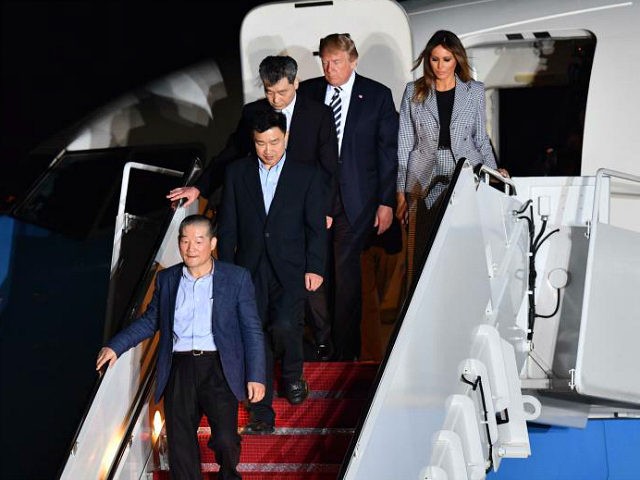Reuters cited half a dozen experts on Wednesday who said the three prisoners freed by North Korea could suffer from post-traumatic stress disorder (PTSD), experiencing symptoms from “anxiety, depression, irritability, and anger” as a result of their ordeal.
The experts said people held in captivity for long periods of time can develop claustrophobia, fear of loud crowds, “hyper-alertness” to perceived threats, reduced cognitive ability, flashbacks to their imprisonment, and nightmares. Eating and sleeping disorders can manifest in former detainees.
The terrible case of one former prisoner named Aijalon Gomes is described:
Last year, former detainee Aijalon Gomes, 38, set himself on fire in a San Diego lot in November 2017 and died. Gomes was held for about seven months in North Korea after he crossed into the country from China in 2010 on what he saw as a religious mission. He suffered from PTSD and had recently left a mental health program against doctors’ advice before his death.
On the positive side, religious faith is described as helpful for enduring captivity and adjusting to life after release, which is fortunate because all three of the men released by North Korea have some affiliation with Christian religious entities.
According to Vice President Mike Pence, one of the three former detainees asked Secretary of State Mike Pompeo if he could get off the plane while it was refueling in Alaska so he could catch a glimpse of sunlight, which he had not seen in “a very long time.”
One of the three, Kim Dong-chul, said upon returning to the United States that he “had a lot of labor work” during his captivity but added he “received some treatment when I was sick.”
Kim Dong-chul is 64 years old, so the toll exacted upon him by forced labor is a matter of no small concern. All three men were taken to Walter Reed Medical Center in Washington for medical examinations.
“The current priority is to allow the returnees decompression time as they transition. Decompression consists of establishing their routine, providing them with rest, and attending to their nutritional and medical needs. We want them to be able to process and integrate their experiences in a healthy manner and this will be facilitated by trained professionals,” said a statement from Walter Reed.
South Korean media have reported the three detainees were subjected to some sort of “ideological education” in the days before they were released.
North Korean defectors tend to exhibit psychological trauma as well as physical ailments after their escape. The difficulty of treatment is compounded by former North Koreans tending to distrust psychological treatment, coming as they do from an environment were psychology is most commonly used by the regime as a weapon to enforce conformity, with dissidents treated as mentally ill and subjected to abusive courses of “treatment.”

COMMENTS
Please let us know if you're having issues with commenting.